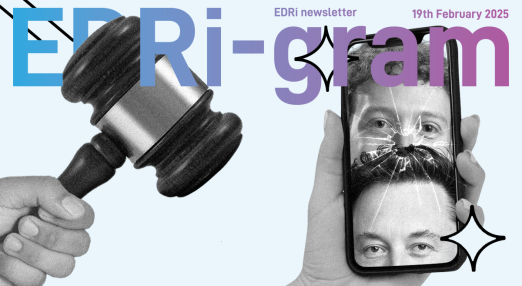EDRigram
Filter by...
-

EDRi-gram, 25 June 2025
What has the EDRis network been up to over the past two weeks? Find out the latest digital rights news in our bi-weekly newsletter. In this edition: The case for a spyware ban, EDRi 2025-2030 strategy, EU must reassess Israel’s adequacy status, & more!
Read more
-

EDRi-gram, 12 June 2025
What has the EDRis network been up to over the past two weeks? Find out the latest digital rights news in our bi-weekly newsletter. In this edition: UK data adequacy under scrutiny, ProtectEU strategy a step further towards digital dystopia, and more!
Read more
-

EDRi-gram, 28 May 2025
What has the EDRis network been up to over the past two weeks? Find out the latest digital rights news in our bi-weekly newsletter. In this edition: Reopening the GDPR is a threat to our rights, 6 years of fighting censorship by Meta in Poland, & more!
Read more
-

EDRi-gram, 7 May 2025
What has the EDRis network been up to over the past two weeks? Find out the latest digital rights news in our bi-weekly newsletter. In this edition: Apple & Meta fined for breaching DMA, civil society urges EU to act against Hungary’s pride ban, & more!
Read more
-

EDRi-gram, 16 April 2025
What has the EDRis network been up to over the past two weeks? Find out the latest digital rights news in our bi-weekly newsletter. In this edition: Challenging data retention regime in Poland, Ljubljana’s municipal surveillance, and more!
Read more
-

EDRi-gram, 2 April 2025
What has the EDRis network been up to over the past two weeks? Find out the latest digital rights news in our bi-weekly newsletter. In this edition: DSA complaint X, New civic coalition for journalists and civil society, imagining EU-topia, & more!
Read more
-

EDRi-gram, 5 March 2025
What has the EDRis network been up to over the past two weeks? Find out the latest digital rights news in our bi-weekly newsletter. In this edition: Our call to reject the Europol reform, UK and France launch fresh attacks on encryption, & more!
Read more
-

EDRi-gram, 19 February 2025
What has the EDRis network been up to over the past two weeks? Find out the latest digital rights news in our bi-weekly newsletter. In this edition: Commission withdraws ePrivacy proposal, new database to track investigations into Big Tech, & more!
Read more
-

EDRi-gram, 5 February 2025
What has the EDRis network been up to over the past two weeks? Find out the latest digital rights news in our bi-weekly newsletter. In this edition: Don’t let Big Tech bully the EU, Commission’s AI Act guidelines should center human rights, & more!
Read more
-

EDRi-gram, 22 January 2025
The EDRi-gram is back after the winter break and yes, we missed you too. Before we dive into the new year, we have a review of 2024 for you. From stopping Chat Control to hosting the first-ever Tech and Society Summit, read up on what kept EDRi so busy last year. In this edition, also catch-up with some important developments from the end of 2024 which are bound to pop up again on the digital rights radar soon. The infamous High Level Group Going Dark presented their "insecurity by design agenda". So don’t be surprised if EU politics sees another iteration of flawed proposals on data retention and circumventing encryption. Ugh. Meanwhile, the European Commission presented their proposal for digitalising travel documents. “Didn’t they promise that for the third quarter of 2023,” you say? Indeed, but after the initiative received a devastating amount of negative feedback, it took more than a year for the adjusted EU travel app proposal. We provide an extensive analysis of the (so far) voluntary system for pre-travel controls. For our more masochistically inclined readers, we take a look over to the US and how corporate social media such as Meta and X align with the new administration. Recent changes to content moderation policies empower far-right extremists and expose marginalised and minoritised communities to hate speech.
Read more
-

EDRi-gram, 4 December 2024
This week, a new college of European Commissioners was confirmed by the European Parliament. Together with a broad civil society coalition, we welcomed them with our collective vision for EU policy that puts technology in the public interest. This call-to-action for the new leadership is crucial, given the worrying Commissioners' hearings in the European Parliament. Their focus on corporate and security interests steeped in, wrapped in a harmful logic of constant growth and control. Below, you can also read our main takeaways from the Commissioners' hearings. It was a mixed bag that reiterated the importance of our efforts towards achieving digital justice. More, we share a critical analysis of the EU's twin transition in times of crises, and its connection to green extractivism and militarisation. Romania has also been on our minds this week – with an unexpected extremist candidate winning the first round of the presidential elections. Civil society in Romania is ringing the alarm about the role that TikTok played in amplifying an existing democracy deficit and social issues, how the tech platform relates to DSA obligations, and what the EU and national authorities can do about it. Finally, EDRi's Executive Director Claire Fernandez is preparing for a leadership transition in 2025. Join us in thanking Claire for her dedication and impact, while reading some reflections below.
Read more
-

EDRi-gram, 20 November 2024
For the last two weeks, we’ve been tuning in to the European Commissioner-designates’ hearings in the European Parliament to hear how would-be EU decision-makers in the Commission envision the role of technology in our future. Some hearings were riveting, while others deeply worrying. It was encouraging to hear that the enforcement of existing digital laws like the GDPR and DSA was high on some Commissioner-designates’ priorities. However, there were also many disturbing mentions of tech hype buzzwords, and no strong commitments to tackle surveillance or protect our right to safe and confidential communications online through encryption. This month, our neighbours across the Atlantic have been reeling from the results of their Presidential election. However, we’re worried about more than just that when it comes to the US. A decade after Snowden’s revelations, and despite continuing privacy concerns, surveillance and mass data collection continue under the EU-US Data Privacy Framework. And the EU appears to be willing to compromise our rights for geopolitical and economic gains.
Read more
